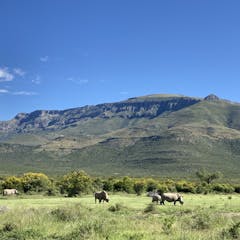
Articles on Namibia
Displaying 1 - 20 of 168 articles

Katherine Browne and Margaret Angula talk to The Conversation Weekly podcast about a UN pilot in Namibia that’s pioneering community-led climate adaptation.

The strategy aims to conserve biodiversity while also contributing to the creation of jobs and economic growth.

There are several reasons why ethical conduct in scientific research is so important.

Hage Geingob’s legacy as a moderniser will live on despite contradictions and unfulfilled promises.

The teachers did not often adapt their practices to suit their specific cultural and linguistic contexts.

To fight global warming we will soon have to try to remove carbon dioxide from the skies or find ways to reflect the Sun’s heat. Such radical paths must be examined, but risky experiments avoided.

Anna “Kakurukaze” Mungunda became the most widely acknowledged face of the resistance to the apartheid policy of forced removal.

Fewer than a quarter of once-colonized countries make official government-to-government requests for an apology or reparations.

Getting climate funds to frontline communities may require rich countries and the UN easing control over how the money is spent.

Ahtisaari’s role in Namibia was crucial. But he left a major legacy in pursuing peace in various places of conflict in his later life too.

Mountain flora in the Kaokoveld deserve priority conservation efforts.

The trend towards decriminalising same sex relations in the SADC region contrasts with moves towards harsher punishment in other parts of Africa.

Oceanographic systems vary over years, decades and centuries.

South Africa eyes a fourth title while Namibia aims to win its first world cup match. Rugby shows huge potential for growth in Africa.

Oil and gas exploration pose a threat to the Okavango River Basin water resources. The Namibian and Botswana governments need to properly assess the risk of contamination.

Immigration policy is so highly politicised that the South African government seems afraid to move.

The sites provide a rare tangible record of the international solidarity that existed during the Cold War.

Africa contributes less than 1% of research worldwide on movement behaviours in children. This means that research on movement behaviours has largely excluded over 16% of the world’s population.

To what extent should the costs of protecting globally valued rhinos be carried by their local custodians?

How Swapo and the ANC respond to any further decline in electoral support will define the future of democracy in both countries.
